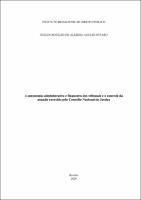Use este identificador para citar ou linkar para este item:
https://repositorio.idp.edu.br//handle/123456789/2871| Título: | A autonomia administrativa e financeira dos tribunais e o controle da atuação exercido pelo Conselho Nacional de Justiça |
| Autor(es): | Notaro, Suelen Botelho de Almeida Aguiar |
| Orientador(es): | Robl Filho, Ilton Norberto |
| Palavras-chave: | Autonomia administrativa e financeira dos tribunais;Controle;Conselho Nacional de Justiça |
| Data de submissão: | 2020 |
| Editor: | IDP/EAB |
| Citação: | NOTARO, Suelen Botelho de Almeida Aguiar. A autonomia administrativa e financeira dos tribunais e o controle da atuação exercido pelo Conselho Nacional de Justiça. 2020. 157 f. Dissertação (Mestrado em Direito Constitucional) – Instituto Brasileiro de Ensino, Desenvolvimento e Pesquisa, Brasília, 2021. |
| Resumo: | O Poder Judiciário exerce, de forma indubitável, parcela do poder do estado, decorrente da
soberania do povo. A história da formação dos Estados modernos mostra o quanto é
indispensável a existência do Poder Judiciário, para a manutenção do equilíbrio dos Poderes
constituídos e a existência do próprio Estado. Ele também exerce papel importantíssimo na
defesa dos direitos fundamentais e na proteção das minorias. A despeito de sua relevância
para a formação equilibrada do ente estatal e da confiabilidade que o Poder goza perante à
sociedade, é pertinente lembrar e debater a sujeição dele ao sistema de accountability, tão
necessário ao sistema democrático e ao Estado de Direito. Trata-se de uma questão delicada
porque, na medida em que o Judiciário tem que se submeter às leis e deve prestar contas à
sociedade, ele também deve dispor de prerrogativas para que exerça sua nobre função de
forma livre e desimpedida. Os impasses que envolvem tal questão embasaram estudos sobre a
accountability judicial e suas particularidades. Nestes, fica claro que a submissão do
Judiciário a instrumentos de controle, mesmo com respeito às suas prerrogativas, é
insuperável no Estado Democrático de Direito. No Brasil, após anos de estruturação deste
Poder, o Constituinte Originário de 1988 lhe conferiu amplíssima liberdade como forma de
romper, de forma definitiva, com as amarras de um passado marcado por regimes ditatoriais.
Contudo, os problemas relativos a dificuldades gerenciais, acúmulo de processos, falta de
transparência e escândalos de corrupção tornaram inadiáveis os debates sobre a criação de um
órgão de controle específico para este Poder, o que se efetivou com a criação do Conselho
Nacional de Justiça em 2004. Este Conselho tem, em resumo, a função de zelar pela
autonomia do Poder Judiciário e, ao mesmo tempo, garantir que os órgãos que o compõem
respeitem, com fidelidade, os princípios previstos no art. 37 da Constituição Federal, em
especial no âmbito administrativo e financeiro. Assim, o estudo ora apresentado tem por
objetivo analisar como, ao longo de quase 15 anos, o CNJ tem compreendido sua função
constitucional de controle e apresentar os principais argumentos que o levam a intervir
administrativamente na atuação dos órgãos do judiciário ou a entender pela prevalência da
autonomia administrativa e financeira daqueles através de um estudo de casos. |
| Abstract: | The Judiciary undoubtedly exercises part of the state's power, resulting from the sovereignty of the people. The history of the formation of modern States shows how essential is the existence of the Judiciary to maintain the balance of the constituted Powers and to the existence of the State itself. It also plays a major role in defending fundamental rights and protecting minorities. In spite of its relevance to the balanced formation of the state entity and the reliability that the Power enjoys in the society, it is pertinent to remember and discuss its subjection to the accountability system that is so necessary to the democratic system and the rule of law. It is a sensitive issue because, to the extent that the Judiciary has to submit to the laws and must be accountable to society, it must also have prerogatives to exercise its noble function freely and unimpeded. The impasses surrounding this issue have supported studies on judicial accountability and its particularities. It is clear that the submission of the Judiciary to instruments of control, even with respect to its prerogatives, is insurmountable in the Democratic Rule of Law. In Brazil, after years of structuring this Power, the Original Constituent of 1988 gave it ample freedom as a way to break definitively the ties of a past marked by dictatorial regimes. However, the problems related to managerial difficulties, accumulation of lawsuits, lack of transparency and corruption scandals made the debates about the creation of a specific control body for this Branch of Power unavoidable, which was accomplished with the creation of the National Council of Justice in 2004. This Council, in summary, has the function of ensuring the autonomy of the Judiciary and, at the same time, ensuring that the bodies that compose it respect, with fidelity, the principles foreseen in art. 37 of the Federal Constitution, especially in the administrative and financial sphere. Thus, the study presented here aims to analyze how, over almost 15 years, the CNJ has understood its constitutional function of control and to present the main arguments that lead it to intervene administratively in the performance of the judicial bodies or to understand by the prevalence of administrative and financial autonomy of those. |
| URI: | https://repositorio.idp.edu.br//handle/123456789/2871 |
| Aparece nas coleções: | Mestrado Acadêmico em Direito Constitucional |
Arquivos associados a este item:
| Arquivo | Descrição | Tamanho | Formato | |
|---|---|---|---|---|
| Dissertação_ SUELEN BOTELHO DE ALMEIDA AGUIAR NOTARO_MESTRADO EM DIREITO_2019.pdf | 1.48 MB | Adobe PDF |  Visualizar/Abrir |
Os itens no repositório estão protegidos por copyright, com todos os direitos reservados, salvo quando é indicado o contrário.
